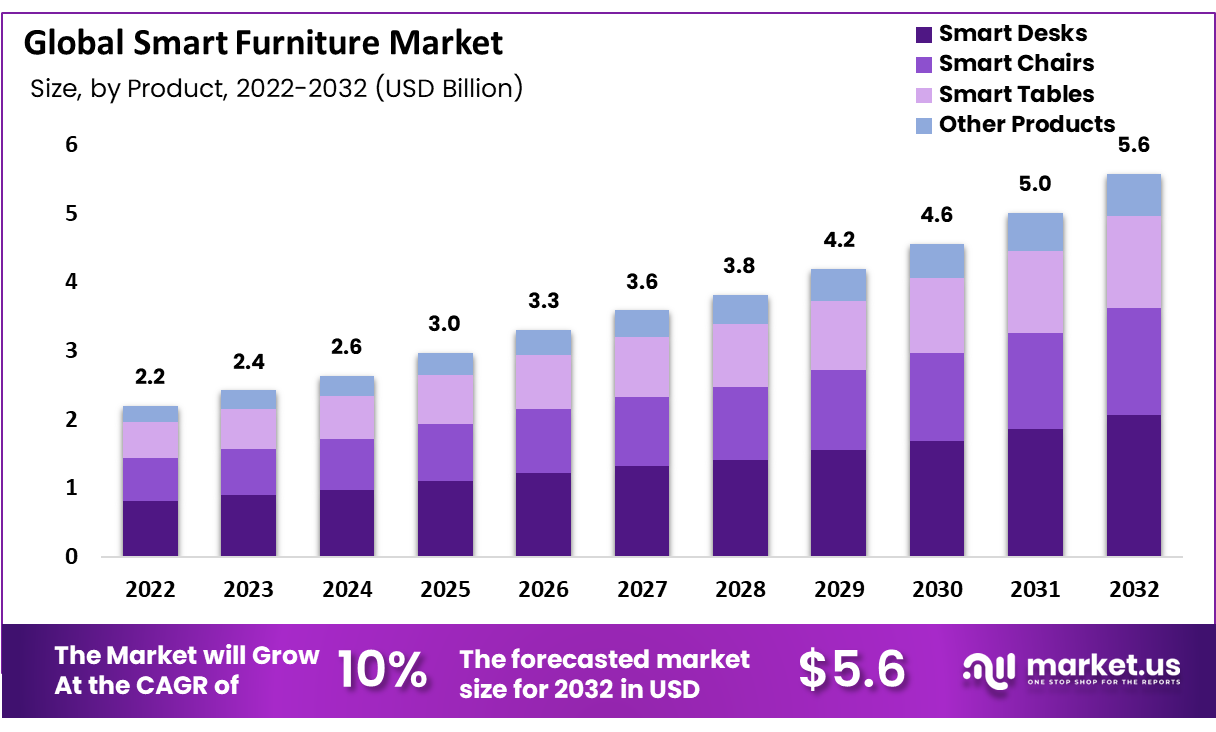Smart Furniture Market Predicted To Reach USD 5.6 Bn In Revenues By 2032 With a 10% CAGR

Page Contents
Market Overview
Published Via 11Press : The Smart Furniture Market encapsulates that portion of the furniture industry that incorporates advanced technologies and connectivity features for greater functionality, comfort, convenience, interactivity, and interoperability. Smart furniture typically integrates IoT (Internet of Things) devices, sensors, and connectivity features that offer various smart capabilities to its consumers.
The Smart Furniture Market Size Was To Reach USD 2.2 Billion In 2022 And is Projected To Reach a Revised Size Of USD 5.6 Billion By 2032, Growing At A CAGR of 10 %
The smart furniture market has experienced significant expansion due to rising consumer interest in connected and intelligent products. Integrating technology into furniture items creates greater value while aligning them with current trends for smart homes and IoT-enabled living environments.
Smart furniture comes in all forms imaginable – beds, sofas, tables, desks, and cabinets are just a few options that fall under this category. Some features of such pieces of furniture might include built-in wireless charging pads or speakers integrated into each furniture piece as well as adjustable settings, temperature controls, ambient lighting with touch controls as well as compatibility with other smart devices, and connectivity with other smart devices.
Request For Sample Report Here: https://market.us/report/smart-furniture-market/#requestSample

Key Takeaways
- Rising Demand: Smart furniture markets have experienced remarkable expansion due to growing consumer interest in connected and intelligent products, particularly furniture that provides convenience, interactivity, and enhanced functionality.
- Integration of Technology: Smart furniture integrates advanced technologies such as IoT devices, sensors, and connectivity features for enhanced automation, personalized experiences, and seamless integration into other smart home devices in the home.
- Convenience and Efficiency: Smart furniture provides enhanced convenience and efficiency by streamlining tasks and routines. Features like wireless charging, voice command, and app connectivity make interacting with their furniture much simpler for users.
- Space Optimization: Smart furniture often incorporates space-saving designs and multifunctioning features, making them the perfect addition to small living spaces. Such solutions maximize space utilization while adapting to meet various needs.
- Health and Wellness Features: Smart furniture pieces often include features to promote healthier lifestyles by correcting posture, ergonomics, or tracking activity levels – such as posture correction or activity tracking – helping users lead healthier lifestyles while alleviating concerns associated with sitting for too long periods. This feature helps foster active living habits as opposed to sitting passively all day.
Regional Analysis
- North America: North America stands out as an innovative region in the smart furniture market due to the presence of tech-savvy consumers with high disposable incomes and an emphasis on home automation, driving its expansion. The United States and Canada serve as key markets within this region.
- Europe: Europe is another key market for smart furniture sales, particularly Germany, the United Kingdom, France, and Scandinavia where smart home technologies such as smart furniture have high adoption rates. Energy efficiency measures, sustainability practices, and modern living concepts all support growth within this region of the market.
- Asia Pacific: Asia Pacific has experienced significant expansion of the smart furniture market. Rapid urbanization, rising disposable incomes, and home incorporation of smart technologies are driving market expansion; key contributors include China, Japan South Korea India.
- Latin America: Latin America represents an emerging market for smart furniture. A growing middle-class population, improved economic conditions and rising awareness of smart home concepts are driving market expansion across countries like Brazil and Mexico.
- Middle East and Africa: The Middle East and Africa regions hold enormous potential for the smart furniture market, particularly affluent countries such as the United Arab Emirates and Saudi Arabia with rapidly developing urban centers that emphasize luxury living – leading to market expansion in this sector.
Drivers
- Consumer Demand for Innovative Furniture Solutions: There has been an exponentially rising consumer appetite for cutting-edge and innovative furniture designed to enhance living experiences, such as convenience, interactivity, and customization of furnishings – driving up demand for smart solutions for furniture solutions.
- Technological Advancements: Rapid advancements in IoT (Internet of Things), AI (Artificial Intelligence), and connectivity technologies have contributed significantly to the rise in smart furniture solutions. Sensor integration, wireless connectivity, and smart controls enable furniture that offers enhanced features and functionality.
- Rising Demand for Smart Homes: As smart home technology becomes more mainstream, its impact has had an immediate and positive effect on furniture markets like smart furniture. When connected to other devices in a connected living environment, smart furniture seamlessly blends in.
- Convenience and Efficiency: Smart furniture provides convenience and efficiency by simplifying tasks and expanding functionality. Features like wireless charging, voice command functionality, and app integration make it simpler for users to interact with their furniture while controlling various aspects of their living environment.
Restraints
- High Cost: Smart furniture often carries a higher price tag compared to its conventional counterpart. The integration of advanced technologies, sensors, and connectivity features increases manufacturing costs which makes smart furniture more costly for consumers; consequently limiting adoption and affordability among a larger consumer base.
- Interoperability Challenges: Lack of standard protocols and interoperability between different smart furniture brands and devices may impede seamless integration and communication, leading to compatibility issues and user frustration that restrict the adoption and usage of smart furniture.
- Privacy and Security Considerations: Smart furniture collects user data such as preferences and usage patterns in order to offer customized experiences; however, such collection raises privacy issues for some consumers and requires robust security measures in place in order to secure these sensitive records from potential breaches or unauthorized access.
- Infrastructure Limits: Smart furniture relies heavily on reliable internet connections and power sources; areas with limited or unstable infrastructure could limit or compromise its functionality and effectiveness, potentially hindering market expansion in certain regions or areas with infrastructure restrictions.
Top Key Players in Smart Furniture Market
- Inter Ikea Systems B.V.
- Sobro
- Sleep Number Corporation
- Hi-Interiors srl
- Motorola Limited
- Herman Miller
- Desktronik
- Nitz Engineering GmbH
- Milano Smart Living
- Other Key Players
Market Segmentation
By Product
- Smart Desks
- Smart Chairs
- Smart Tables
- Other Products
By Application
- Residential
- Commercial
By Distribution Channel
- Online
- Offline
Make an Inquiry Before Picking Up This Report @ https://market.us/report/smart-furniture-market/#inquiry
Opportunities
- Expanding Smart Home Ecosystems: As smart home ecosystems continue to flourish, more opportunities arise for smart furniture to integrate and collaborate with other devices within an automated home system, providing seamless integration and improving overall home automation experiences.
- Customization and Personalization: Smart furniture has the capacity to capitalize on the trend toward customization and personalization, providing consumers with customizable colors, materials, functionalities, and smart features for creating tailored pieces to fit their own preferences and needs.
- Integration of Artificial Intelligence and Machine Learning Technologies: Integrating AI (Artificial Intelligence) and machine learning technologies can enhance the capabilities of smart furniture, enabling it to recognize user preferences, adapt to behavior patterns, provide tailored recommendations or experiences, and open doors to more intuitive interactions between furniture users.
- Healthcare and Wellness Applications: Smart furniture has the power to facilitate healthcare and wellness initiatives. Integrating health monitoring sensors, posture correction features, and activity tracking capabilities into furniture may provide insight into its users' well-being – creating opportunities to partner with healthcare providers or wellness companies on innovative solutions.
Challenges
- High Cost: Smart furniture typically carries a higher price tag compared to its conventional counterpart, as its integration of advanced technologies, sensors, and connectivity features increase manufacturing costs significantly, driving up consumer prices further and potentially hindering its adoption by more people. Such high costs could limit adoption as well as affordability across a broader consumer base.
- Interoperability Challenges: Due to a lack of standard protocols and interoperability among various smart furniture brands and devices, integration and communication issues between smart furniture pieces and other home devices may impede seamless interaction and development, leading to compatibility issues and user frustration limiting user adoption of smart furniture products.
- Privacy and Security Issues: Smart furniture uses user data collection methods such as preferences and usage patterns for personalized experiences; however, such collection raises privacy issues with some consumers and requires strong safeguards to safeguard user data against breaches or unauthorized access.
- Infrastructure Limits: Smart furniture depends heavily on reliable internet connectivity and power supplies to be successful, and areas with limited or unstable infrastructure could significantly impede its functionality and effectiveness, potentially hindering market expansion in these regions.
Recent Development
- Integration of Voice Assistants: Voice assistants like Amazon Alexa and Google Assistant have increasingly become part of smart furniture pieces like sofas, beds, and tables – giving users control of functions via voice command. Users are now able to control various functions or access information quickly with just voice control on these pieces!
- Health and Wellness Features: Smart furniture has recently seen an increased focus on including health and wellness features for optimal living, such as sleep tracking capabilities, adjustable mattresses for optimal sleeping positions, built-in sensors to monitor vital signs, posture correction features on chairs or desks that remind users about ergonomic positioning – these may all contribute towards better wellbeing overall.
- Smart Desks and Workstations: As remote work becomes more prevalent and flexible home offices become a necessity, smart desks have gained increased popularity among workers looking for flexible home offices. These workstations feature adjustable height settings, built-in charging ports with wireless capabilities for charging capabilities as well as integrated connectivity features to increase productivity while improving comfort levels and enhance comfort levels for enhanced productivity and comfort.
- Sustainability and Eco-Friendly Materials: Smart furniture manufacturers are increasingly prioritizing sustainability. They use eco-friendly materials such as recycled plastics, bamboo fiber, and sustainable wood in the production of smart furniture; as well as energy-saving components and power savings features designed to minimize their environmental footprint.
Report Scope
| Report Attribute | Details |
| The market size value in 2023 | USD 2.2 Bn |
| Revenue Forecast by 2032 | USD 5.6 Bn |
| Global Market Growth Rate (2023 to 2032) | CAGR Of 10 % |
| Regions Covered | North America, Europe, Asia Pacific, Latin America, and Middle East & Africa, and Rest of the World |
| Historical Years | 2017-2022 |
| Base Year | 2022 |
| Estimated Year | 2023 |
| Short-Term Projection Year | 2028 |
| Long-Term Projected Year | 2032 |
FAQs
Q1: What is Smart Furniture?
A1: Smart Furniture Refers to furniture pieces that are integrated with advanced technologies, connectivity features, and sensors to offer enhanced functionality, convenience, and interactivity. These furniture pieces can be controlled, monitored, and customized through various devices like smartphones or voice assistants.
Q2: How big is the Smart Furniture Market?
A2: The global Smart Furniture Market size was estimated at USD 2.2 billion in 2022 and is expected to reach USD 5.6 billion in 2032.
Q3: What is the Smart Furniture Market growth?
A3: The global Smart Furniture Market is expected to grow at a compound annual growth rate of 10%.
Q4: Who are the key companies/players in the Smart Furniture Market?
A4: Some of the key players in the Smart Furniture Markets are Inter Ikea Systems B.V., Sobro, Sleep Number Corporation, Hi-Interiors srl, Motorola Limited, Herman Miller, Desktronik, Nitz Engineering GmbH, Milano Smart Living, Other Key Players
Q5: What are the key benefits of smart furniture?
A5: Smart furniture offers several benefits, including increased convenience, automation, customization, and connectivity. It can provide features such as wireless charging, voice control, adjustable settings, health monitoring, and seamless integration with other smart devices in the home.
Q6: How does smart furniture work?
A6: Smart furniture incorporates technologies like IoT (Internet of Things), sensors, and connectivity modules. These components allow the furniture to communicate with other devices, collect data, and enable user control through smartphone apps or voice commands.
Contact
Global Business Development Team – Market.us
Market.us (Powered by Prudour Pvt. Ltd.)
Send Email: [email protected]
Address: 420 Lexington Avenue, Suite 300 New York City, NY 10170, United States
Tel: +1 718 618 4351
Website: https://market.us/
Content has been published via 11press. for more details please contact at [email protected]
The team behind market.us, marketresearch.biz, market.biz and more. Our purpose is to keep our customers ahead of the game with regard to the markets. They may fluctuate up or down, but we will help you to stay ahead of the curve in these market fluctuations. Our consistent growth and ability to deliver in-depth analyses and market insight has engaged genuine market players. They have faith in us to offer the data and information they require to make balanced and decisive marketing decisions.



